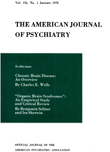Meprobamate: A Study of Irrational Drug Use
Abstract
The history of the tranquilizer meprobamate illustrates how factors other than scientific evidence may determine physicians' patterns of drug use. Forceful advertising and publicity, an attitude of general optimism, and uncontrolled studies with favorable results combined to elevate meprobamate to the position of America's magical cure-all tranquilizer. This drug remains in wide use despite a large body of sound scientific data that questions its efficacy. Today easy pharmacologic solutions to the stresses and tensions of life are often sought in place of more effective forms of mastery. This trend, which may not be a healthy one, is fostered by physicians who prescribe tranquilizers indiscriminantly.
Access content
To read the fulltext, please use one of the options below to sign in or purchase access.- Personal login
- Institutional Login
- Sign in via OpenAthens
- Register for access
-
Please login/register if you wish to pair your device and check access availability.
Not a subscriber?
PsychiatryOnline subscription options offer access to the DSM-5 library, books, journals, CME, and patient resources. This all-in-one virtual library provides psychiatrists and mental health professionals with key resources for diagnosis, treatment, research, and professional development.
Need more help? PsychiatryOnline Customer Service may be reached by emailing [email protected] or by calling 800-368-5777 (in the U.S.) or 703-907-7322 (outside the U.S.).



